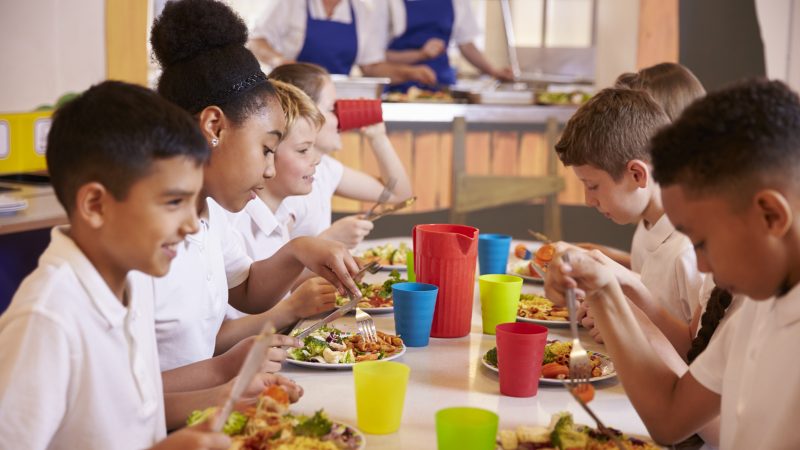
With many families facing unprecedented financial hardship amid the cost-of-living crisis, it comes as no surprise to anyone that it is our children who are suffering the most. The huge challenges an increasing number of families are facing have been compounded by Whitehall not seizing the policy initiative, such as the government’s food strategy. This was is a huge, missed opportunity to support families through the cost-of-living crisis and should have gone much further – particularly for those vulnerable groups who are already disproportionately affected, such as single parent households.
More children should be given free school meals to help tackle the devastating reality of the cost-of-living crisis. With the publication of the recent data, it has emerged that a further 800,000 children in working households are growing up in poverty, but these children are not currently eligible for free school meals.
There is more we could, and should, be doing to protect the most vulnerable children and give them the best chance of a good start in life. Free school meals are key to this as they provide a vital source of nourishment and remove a real barrier to learning. With one in four of our children in Coventry schools receiving free school meals, we know all too well the genuine need for this support. But more must be done to help vulnerable families during these times. There are two policy initiatives the government should act upon now:
- Extend the eligibility of free school meals so that more vulnerable families can access this support; and
- Fund meal vouchers during all school holidays, so those families that rely on free school meals can continue to provide a meal for their children during all school breaks.
There will undoubtably be push back to these proposals. The concept of additional funding at a time of national financial challenge will lead many to suggest extensions to free school meals are not financially viable. It is acknowledged that local authorities have already been allocated funds, through the household support fund, to help families. Those working in local government, however, know the difficult choices we face when using the fund as it must be used to support pensioners and other vulnerable groups within our communities.
The Coventry holidays and activities programme is funded through the household support fund. Unfortunately, the limited funding means that each child eligible to attend the programme this summer receives 64 hours of support over the holidays, which includes a maximum of 16 meals over the duration of the programme. It is important for the government to make a bold decision, therefore, and increase direct funding for free school meals.
Schools across the country have been reporting that caterers are having to reduce portion sizes or replace food items with cheaper alternatives. This is being driven by the increased costs of providing school meals. The government runs the risk of exacerbating the crisis by continuing to underfund schools’ provision of free school meals. A bold alternative would be to give all children from families who receive Universal Credit free school meals.
The reality is that many parents of such children are already skipping meals themselves to ensure their children eat as the cost-of-living pressures, including energy and price rises, continue to grow and bite. This simple policy shift would see an increasing number of vulnerable children across our country provided with a nourishing meal that helps them learn, grow and develop and where their parents may not be forced to skip meals themselves.
The announcement of a 7p increase for key stage 1 free school meals last month is significantly below inflation, which is now pushing 10%. Schools across the country are reporting having to use reserves to supplement catering costs. One head teacher in Coventry recently told me that the school is seeing a marked increase in dinner money debt. The school now faces difficult choices about whether to accrue debt from parents or see children go hungry.
With a backdrop of post-Covid educational difficulties for many children, radical reform is needed to ensure we do not stifle generations of children’s education because they are not able to concentrate in class due to hunger and malnutrition.
As well as extending the availability of free school meals, it is important that families in receipt of this support are not discriminated against during the school holidays. Why is it acceptable to provide a vulnerable child with a meal during the school term but not the school holidays? If we want to level up, we must support those vulnerable families and provide them with the dignity they deserve during these challenging times.
The new Prime Minister and their government has a chance to meet the needs of those families who currently receive free school meals or are living in poverty but are not eligible for free school meals, by providing sufficient funding for schools to allocate meal vouchers during the school holidays. With the cost-of-living crisis hitting our most vulnerable residents, now is the time for government to act to support our families who are most in need.
Any crisis needs bold and courage decisions. Now is the time to lead the change some of our most vulnerable in society require. An extension of access to free school meals and funding to support meal vouchers during school holidays provides an opportunity for impactful and lasting change.



More from LabourList
Key local council elections to watch for clues on our general election chances
Andy Burnham manifesto: Greater Manchester mayor reveals three key election pledges in bid for third term
‘Labour should grasp the chance to secure EU visa deal for young workers’